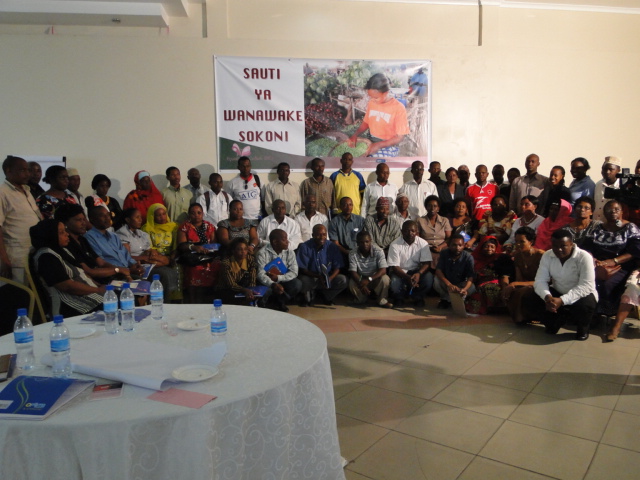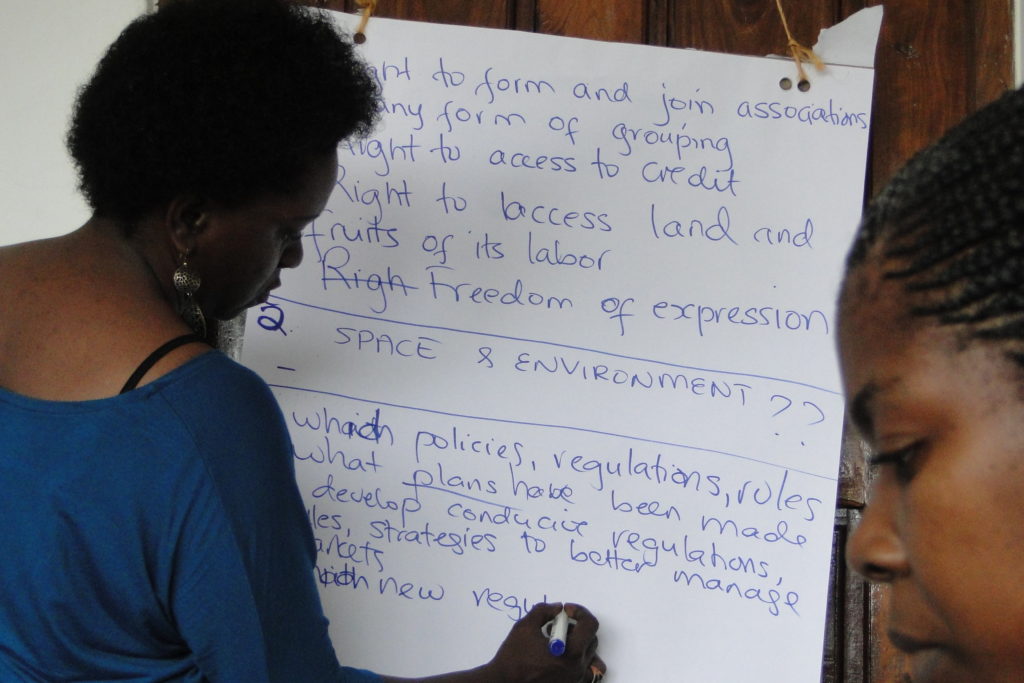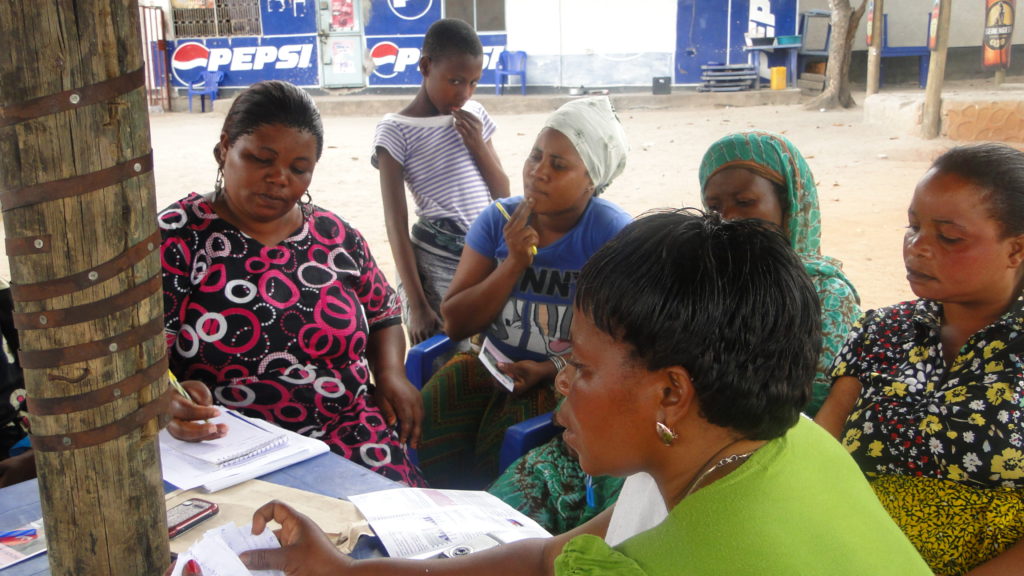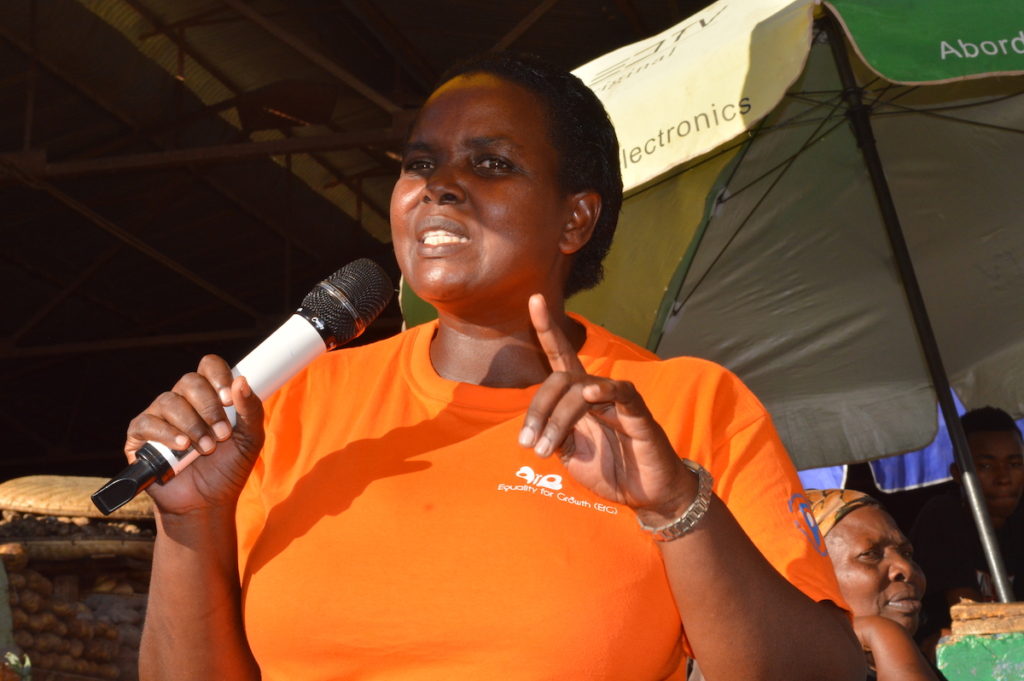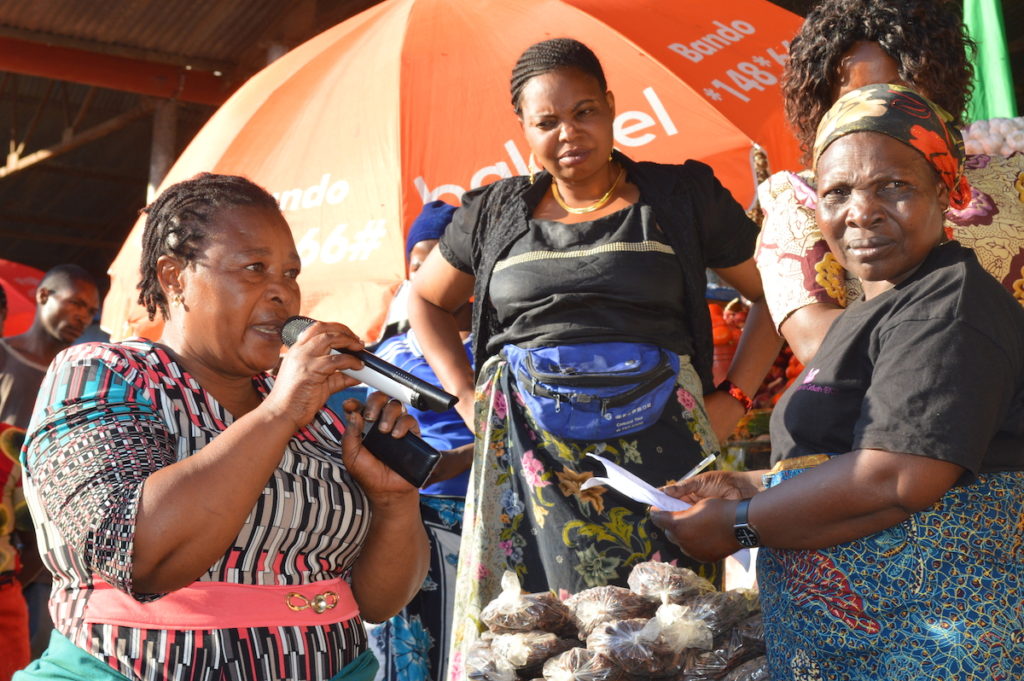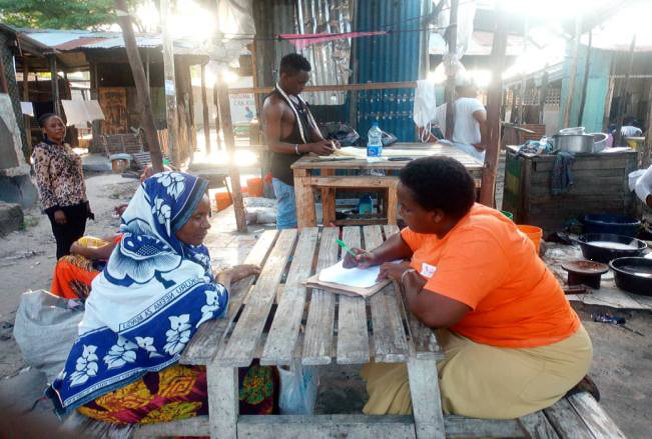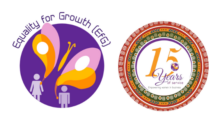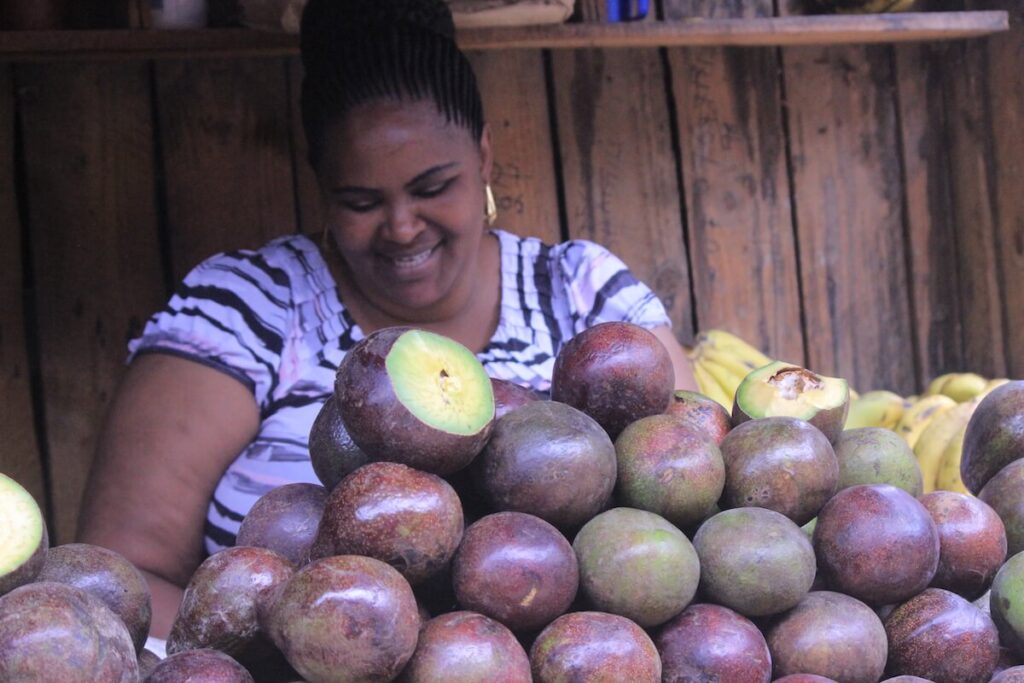
Drought and water scarcity were major issues faced by the community with 96% and 97% of respondents identifying these issues respectively (EFG study). During climate-related disasters women and girls are 14 times more likely to experience GBV and harm than at other times (UN study).
Since 2008 EfG has been working to strengthen the voice, visibility, and rights of women who operate in Tanzania’s informal economy. We primarily operates through our Sauti ya Mwanamke Sokoni model, which addresses inequalities faced by women market traders and empowers them to pursue livelihoods free from harassment and abuse. Our work spans the twin aspects of economic and political empowerment, with our model providing the building blocks for sustainable change through citizen-driven institutional reform.
A key component of our work is challenge gender norms and gender-based violence (GBV) through conducting anti-GBV campaigns in markets, and develop support pathways for women traders to access legal support if they experience GBV.
The enduring importance of addressing GBV
Despite 15 years of working to address GBV, it remains a salient issue for women working informally across the Tanzania. Through our grassroots work we know that GBV in marketplaces is evolving. Women are facing increasing instances of their goods or money being forcibly taken from them as they threaten entrenched economic interests. They also encounter exploitation for sex and the pressure to conduct sexual acts in payment for goods appears to be rising. In addition, as climate change impacts become increasingly pervasive in Tanzania , and globally, we are beginning to see increased linkages between GBV and climate change.
The evolving nature of GBV and links to climate change
Women and girls are often impacted by climate change differently than men and boys. This difference is accentuated in developing country contexts where climate change exacerbates existing unpaid work and care burdens, such as having to travel further or at more precarious times to collect water. The UN estimates that 80% of those displaced by climate change will be women and girls who are at higher risk of violence and poverty than their male counterparts. Research has shown that during climate-related disasters women and girls are 14 times more likely to experience GBV and harm than at other times . Pre-existing inequalities and gender disparities can exacerbate the impacts of climate change when they occur and can make it more difficult for women and girls to recover in the wake of climate related shocks.
East Africa, particularly Kenya and Tanzania, have experienced heavy flooding in recent months due to the combination of changes in climate and a severe El Niño. This combination is indicative of seasonal variation in weather patterns, such as El Niño, becoming more severe in the context of climate change. Over 150 individuals perished in Tanzania due to flooding this year (2024) alone. Climate change not only poses a direct risk of loss of risk life, but severe weather events such as flooding and wildfires can put additional care burdens on women and girls who are already responsible for the majority of reproductive activities.
These increased demands can result in violence from male partners as well as other family members when women are not viewed to be fulfilling their duties. Further, when resources are scarce women and girls face a higher likelihood of being sexually exploited in exchange for money, goods, and/or services. Young women are particularly vulnerable as they face increased risk of being taken out of school to support their families through work, shouldering more reproductive care activities or early marriages when resource limited.
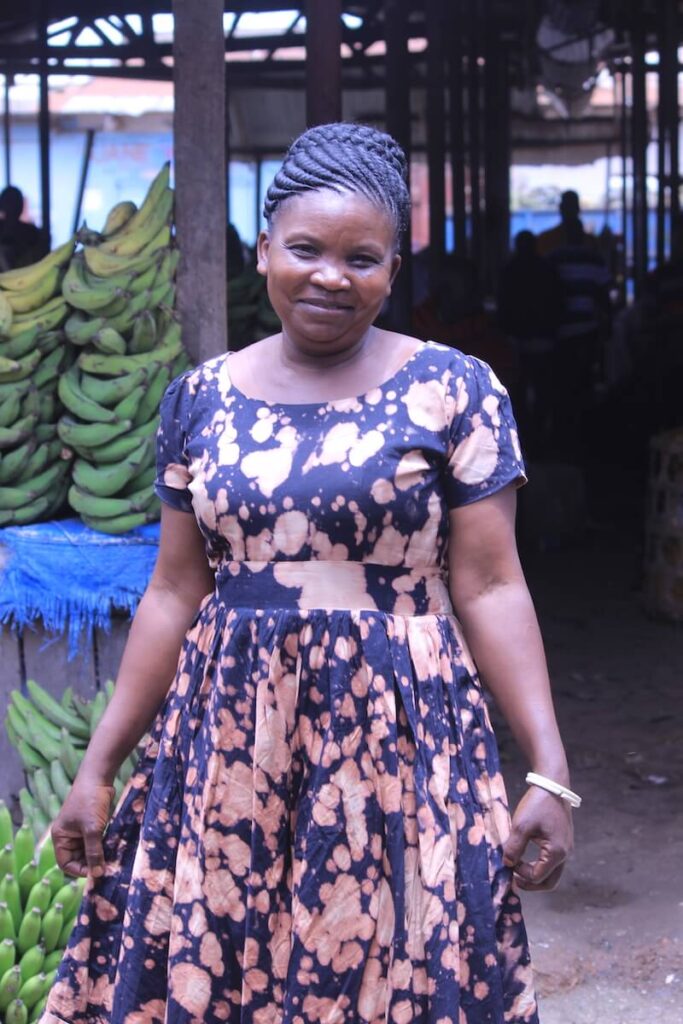
Our work on climate change to date
Recognizing the growing prevalence of climate change impacts in the communities of market women we support, EfG has begun working to integrate climate change considerations into our programming. We have also recently delivered a project called “Improving Living and Learning Environment through WASH and Livelihoods Support, Land and Property Rights Advocacy, and Climate Change Impact Mitigation” funded by Habitat for Humanity Tanzania. This project was implemented between May to December, 2023 in Chamwino District, Dodoma Region. Through this project we conducted an assessment of the climate change effects in the district. Only 32% of the community members surveyed by EfG were aware of climate change, yet EfG’s assessment found that climate change had at least a moderate effect on 62% of individuals’ livelihoods. Drought and water scarcity were major issues faced by the community with 96% and 97% of respondents identifying these issues respectively.
The relationship between climate change and informal work is complex. 96% of market leaders responding to the survey reported that market trader use charcoal and firewood as a source of energy in their livelihood activities, such as cooking. While income generation is a priority for informal workers the use of such fuels contributes to deforestation, air pollution, and climate change. Environmental pollution, including air pollution, was reported as an issue by nearly a third of ward leaders. In addition to reduced air quality from burning charcoal, ward leaders pointed to poor waste disposal practices and excessive dumping of solid waste generated by markets.
The project has successfully raised awareness of climate change, its causes, effects, and the importance of environmental protection among 768 community members across six wards in Chamwino District: Msanga, Bwigili, Msamaro, Handali, Chironwa, and Chamwino. This significant outreach effort has helped to inform and educate diverse segments of the community about the critical issues related to climate change and environmental sustainability.
EfG has also been instrumental in training economic groups comprising women, youth, and People Living with Disabilities in garbage recycling as an income-generating activity. This initiative provided 24 members from the six wards with comprehensive knowledge and practical skills in garbage recycling. They learned not only how to recycle waste but also gained an understanding of environmental preservation and its sources, climate change, the causes behind it, and its far-reaching effects. These training sessions aimed to empower these groups with the tools and information needed to contribute to environmental conservation while also creating economic opportunities.
In addition to education and training, community engagement activities were conducted to further promote environmental conservation. These activities included tree planting initiatives across the six wards of Msanga, Bwigili, Msamaro, Handali, Chironwa, and Chamwino. Through these efforts, a total of 518 trees were planted, contributing to reforestation and the enhancement of local ecosystems. The tree planting activities not only helped to improve the local environment but also served as a practical demonstration of the community’s commitment to combating climate change.
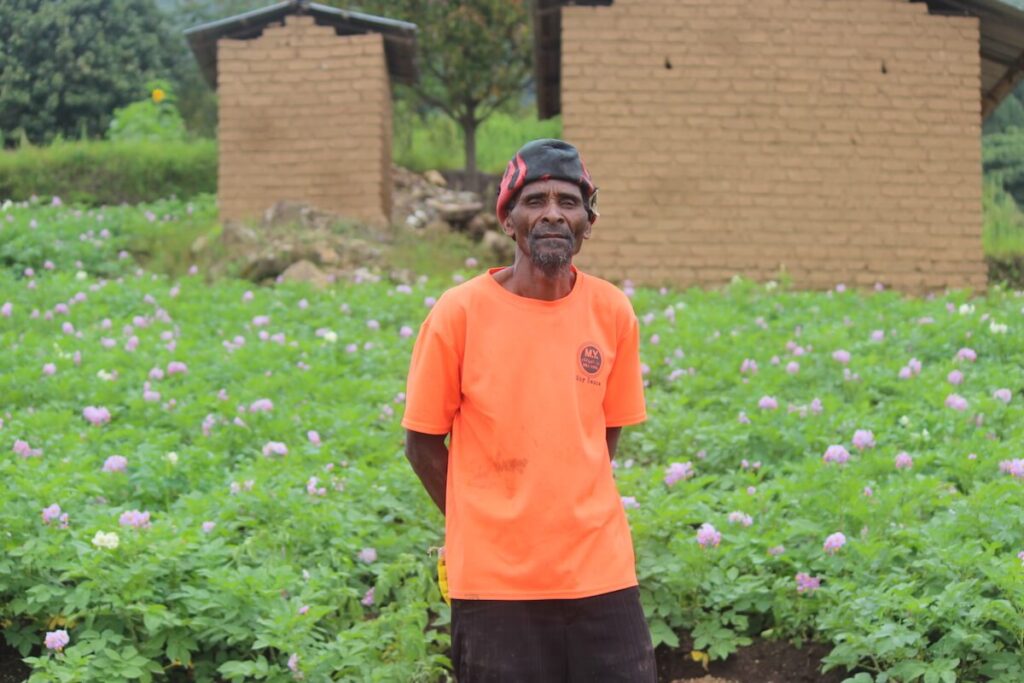
The project also focused on enhancing the knowledge and capacity of local authorities and ward leaders regarding climate change and environmental protection. After receiving targeted training, village chairpersons, ward executive officers, village executive officers, and primary school teachers have been working collaboratively to safeguard the environment within their communities. This improved collaboration and understanding among local leaders are vital for the long-term success of environmental conservation efforts.
Clean community campaigns and community sensitization on waste reduction were also conducted in the wards of Msanga, Chamwino, and Bwigili. These campaigns involved a series of activities designed to promote cleanliness and reduce waste in the community. As part of these efforts, two dustbins were purchased and handed over to the Chamwino and Bwigili wards, providing essential infrastructure to support waste management. Additionally, a total of 1,166 community members (595 female and 571 male) benefited from the awareness sessions conducted in the six wards. These sessions aimed to educate the community about the importance of waste reduction and proper waste disposal practices.
An inter-school dialogue session on climate change and environmental conservation was held at Chamwino Primary School, with participation from Msanga Primary School. This session provided a platform for students to share their understanding of climate change, its causes, and effects, as well as strategies to combat it. During the dialogue, students engaged in meaningful discussions and exchanged ideas on how they can contribute to environmental conservation efforts in their own schools and communities. This initiative helped to foster a sense of responsibility and proactive thinking among the young participants, empowering them to become advocates for environmental sustainability. Overall, the project has made significant impact in raising awareness, educating diverse groups, and promoting active participation in environmental conservation across Chamwino District. By engaging community members, local leaders, and students, the project has laid a strong foundation for continued efforts to combat climate change and protect the environment for future generations. EfG expresses its gratitude to Habitat for Humanity Tanzania for their invaluable support in making this project possible.
The path ahead
3Going forward EfG will be taking steps to ensure climate change awareness is integrated into our model and our work. We will also be aiming to address GBV induced and/or worsened by climate change working with key stakeholders including market leaders and government representatives at multiple levels. Through our increased focus one climate change in our programming we aim to bring the key intersecting areas strands of climate justice, gender justice, and economic justice together to empower women working across Tanzania’s informal sector and markets.
